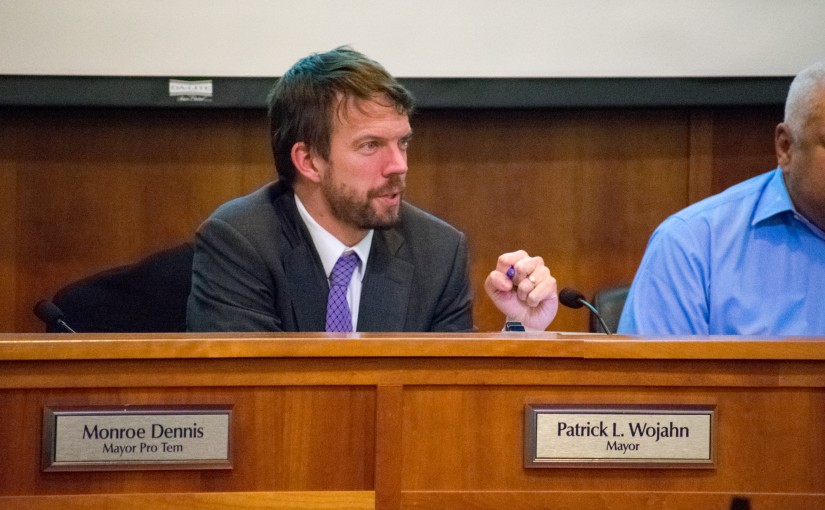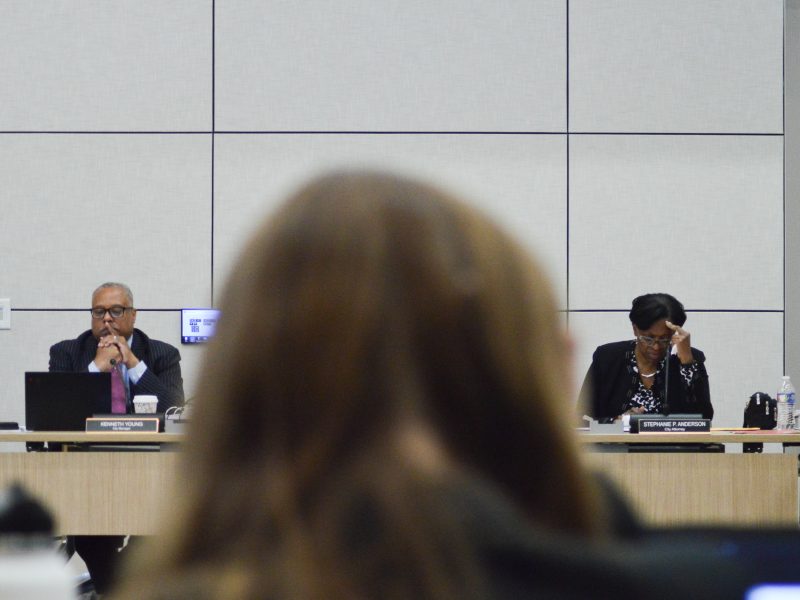In discussing an amendment to College Park’s charter, the city council voted 6-2 Tuesday to remove a section of the measure that would require a simple majority, rather than a supermajority, to alter the charter.
The city’s charter currently requires a supermajority to pass charter amendments, but this mandate was found to be in violation of state law.
The move, which was proposed by District 4 Councilwoman Dustyn Kujawa, elicited a heated debate among council members on whether they were rushing the issue.
[Read more: College Park residents aren’t pleased with the options for Rhode Island Avenue bike lane]
The removed section of the charter amendment resolution also calls the council a “legislative body,” which has been contested by council members and residents, as some believe it should instead say “elected body.”
“A lot of residents — and even some of us on council, to be transparent — are still trying to understand the difference between legislative and elected,” District 4 Councilwoman Denise Mitchell said.
District 2 Councilman Monroe Dennis said he seconded the modification of amendment for clarification purposes.
“Part of what I’m hoping is that we’ll have an opportunity with this amendment in the future to clarify amongst ourselves, and also to help the residents who are saying that the charter is not clear, not organized and other issues that we hopefully we could work out in the near term,” he said.
District 3 Councilman Robert Day cautioned against making changes to the charter that are too big too quickly.
“We need to take small steps, small chunks and address the issues in multiple steps,” he said. “We may end up coming right back to where we are talking about now, but hopefully … [we can] clarify things, get opinions and work to clear things up in a way that everybody will understand what we’re trying to do.”
Mayor Patrick Wojahn expressed his concern and surprise regarding council members speaking up about a lack of understanding as they were supposed to vote on the amendment.
“If there was a misunderstanding, we talked about this at several closed sessions, I think at least [someone] from the council could have brought that up then,” he said.
This city’s charter was found to be noncompliant with state law in October. City officials announced in September that a measure to allow non-U.S. citizens to vote in College Park — which appeared to pass with a 4-3 vote with one abstention — did not pass because the city charter required a supermajority as of June.
The council chose on Feb. 6 to introduce a measure calling for a simple majority threshold for charter amendments and maintains the mayor’s current voting role, in which the mayor votes only in the case of a tie. This change is more consistent with state law for passing charter amendments, Wojahn said.
Multiple residents who testified Tuesday said the charter’s language is unclear.
“It’s not just me, but everyone I’ve spoken to is completely befuddled,” West College Park Civic Association President Suchitra Balachandran said. “The charter, which is our charter, is something that we ought to be able to read and understand.”
Former District 4 Councilwoman Mary Cook attended the meeting and said the charter’s language is in contrast to the council’s goal of transparency.
“One of your priorities is to be transparent in your governing, and when this document — which is the foundation of the City of College Park — is unclear, then you’re not meeting the standards of transparency,” she said.
[Read more: College Park City Council wants to require members to give reasons for abstaining]
Much of the discussion between the council and city attorney Suellen Ferguson during the meeting revolved around the mayor’s role.
“In response to the legal review that was done, it is very clear what the words of the state law are in these two instances,” Ferguson said. “A charter amendment must be adopted by the majority of a legislative body.”
While the majority of this legislative body would be five votes, Ferguson said, state law does not say how to reach that five or whether the mayor can be included in this number.
The council will vote on the amendment at the March 6 work session if council members vote to add it to the agenda, District 3 Councilman John Rigg said.



